Bulgaria Benefits from the EU funds, but It Needs to Show Real Results
Ralitsa Kovacheva, September 19, 2012
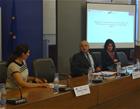 The benefits for the Bulgarian economy from the absorption of EU funds are undeniable and already measurable as well. Using the econometric simulation model SIBILA* we can measure the effect of EU structural and cohesion funds on the Bulgarian GDP, employment and income. The model compares two main scenarios – the baseline (without EU funds) and the alternative (including the EU structural instruments). The difference between the two scenarios shows the impact of EU funds on the economy.
The benefits for the Bulgarian economy from the absorption of EU funds are undeniable and already measurable as well. Using the econometric simulation model SIBILA* we can measure the effect of EU structural and cohesion funds on the Bulgarian GDP, employment and income. The model compares two main scenarios – the baseline (without EU funds) and the alternative (including the EU structural instruments). The difference between the two scenarios shows the impact of EU funds on the economy.
The model can assess both the real impact of money already absorbed and the potential effect of the allocations for the whole programming period. SIBILA allows also to assess the impact of even a single project, procedure or programme, as well as combinations of these. It follows the impact on the main factors of competitiveness - human capital, research, innovation, information and communication technology, infrastructure and production capacities. SIBILA enables evaluation of the effects of different economic policies, including the impact of public investment as envisaged in "Bulgaria 2020" programme.
According to calculations made through SIBILA, as far as the Bulgarian economy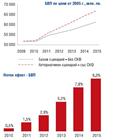 has grown in the last year, that growth was mainly due to the cohesion funds: 65% of the GDP growth for 2011 was due to European money. Thanks to it the GDP in 2011 was 1.5% higher than it would have been has Bulgaria not received EU money. The estimated impact on the 2012 GDP is of an increase of nearly 3% compared to the scenario without EU funding. In case of full absorption of EU funds, in 2015 the real GDP would be 9.3% more than it could be without them.
has grown in the last year, that growth was mainly due to the cohesion funds: 65% of the GDP growth for 2011 was due to European money. Thanks to it the GDP in 2011 was 1.5% higher than it would have been has Bulgaria not received EU money. The estimated impact on the 2012 GDP is of an increase of nearly 3% compared to the scenario without EU funding. In case of full absorption of EU funds, in 2015 the real GDP would be 9.3% more than it could be without them.
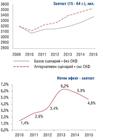 The effect on employment is also beneficial - at the end of 2011, employment in the economy has increased by 2.6% compared to scenarios without EU funding, and in 2015 will increase by 4.8%. By 2015, unemployment is expected to be 1.5 percentage points less, compared to the baseline scenario without EU funding. Provided that there is 100% absorbtion of the EU funds by 2015, the average wage would be nearly 35% bigger than in the case with no EU funds.
The effect on employment is also beneficial - at the end of 2011, employment in the economy has increased by 2.6% compared to scenarios without EU funding, and in 2015 will increase by 4.8%. By 2015, unemployment is expected to be 1.5 percentage points less, compared to the baseline scenario without EU funding. Provided that there is 100% absorbtion of the EU funds by 2015, the average wage would be nearly 35% bigger than in the case with no EU funds.
When talking about data based on 100% absorption, however, we must consider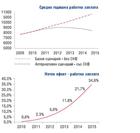 that Bulgaria is currently implementing projects totaling 14 billion BGN (7 billion euro), which is 90% of the Bulgarian allocations for the current programming period. Only 4.2 billion BGN (2.1 billion euro) are actually paid, or 27%. During the current programming period, Bulgaria may negotiate financial resources under the operational programmes by the end of 2013 and make payments by the end of 2015.
that Bulgaria is currently implementing projects totaling 14 billion BGN (7 billion euro), which is 90% of the Bulgarian allocations for the current programming period. Only 4.2 billion BGN (2.1 billion euro) are actually paid, or 27%. During the current programming period, Bulgaria may negotiate financial resources under the operational programmes by the end of 2013 and make payments by the end of 2015.
 2013 will be a decisive year because there will be a larger amount of payments to be served, while at the same time Bulgaria has to negotiate with the European Commission the money and programmes within the next seven-year EU budget. Moreover, there will be parliamentary elections in mid-2013. "Three or four months, when much of the public attention will be engaged with the election, certainly will not have a good effect on the process, I hope it will not be detrimental," Bulgarian Minister on EU Funds Management Tomislav Donchev commented.
2013 will be a decisive year because there will be a larger amount of payments to be served, while at the same time Bulgaria has to negotiate with the European Commission the money and programmes within the next seven-year EU budget. Moreover, there will be parliamentary elections in mid-2013. "Three or four months, when much of the public attention will be engaged with the election, certainly will not have a good effect on the process, I hope it will not be detrimental," Bulgarian Minister on EU Funds Management Tomislav Donchev commented.
He stressed that it was important for Bulgaria to have a system for measuring the economic benefits from the EU funds, not only to know the real impact of the investments but to use this as an argument in the negotiations on the future of cohesion policy in the next Multiannual Financial Framework (MFF) 2014-2020. As you know, currently there is a group of member states called "Friends of better spending" that insists on reducing the overall MFF ceiling and cohesion funds in particular. Another group called "Friends of Cohesion Policy" in turn wants to preserve the cohesion funds at their current levels. In addition to overall ceiling, there is a number of other controversies between the two groups relating to the conditions for using the cohesion funds.
Under these circumstances, it is important for Bulgaria to participate actively in the negotiations, not only in an agreement-disagreement regime in terms of the new regulations, but to make concrete proposals, based on its experience, which is now possible and welcomed by other countries, Minister Tomislav Donchev said. Moreover, he added, "to put it simply, there is an allergy formed in some Member States in terms of the consummatory nuance in the use of European money. Investment, however, which has rather brought better economic results to a Member State or to Europe - it works and can be used as an argument." Therefore, Bulgaria has the ambition to show the effects of these investments not only in terms of its own economy, but the economies of other member states as well.
It has long been proven that both poor and rich regions and member states benefit form the cohesion policy. The Third Report on the Economic and Social Cohesion from 2004 states that "on average, around a quarter of structural expenditure returns to the rest of the Union in the form of increased imports, especially of machinery and equipment". A study conducted by the Polish Ministry of Regional Development shows that in 2004-2009, about 27% of the funds Poland received returned directly or indirectly to the 15 old Member States (EU15). This makes 70 billion euros over seven years, the study shows.
However, the recent negotiations on the MFF showed that it appears inevitable to cut the updated Commission proposal of 6 July (including Croatia). The European Parliament, however, is ready to block the budget if the member states cut spending. "The amount of EUR 376 billion for Cohesion policy, as proposed by the Commission in its proposal for a regulation laying down the multiannual financial framework for the years 2014-2020, should be considered as a minimum sound level of funding and should, therefore, constitute a red line in the future negotiation position of the Parliament," reads an opinion of Bulgarian MEP Andrey Kovachev (EPP-GERB), supported by a large majority in the Committee on Regional Development in the European Parliament. The Bulgarian MEP is the committee’s rapporteur on the MFF 2014-2020.
* Simulation of Bulgaria's Investment in Long-term Advance.
 Kristalina Georgieva | © Council of the EU
Kristalina Georgieva | © Council of the EU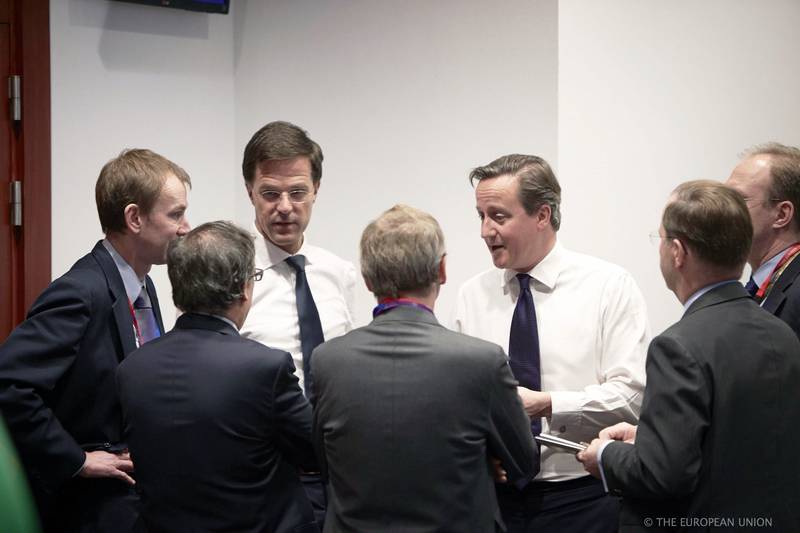 Mark Rutte, David Cameron | © Council of the EU
Mark Rutte, David Cameron | © Council of the EU | © European Parliament
| © European Parliament